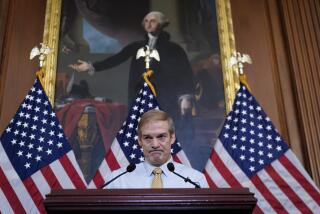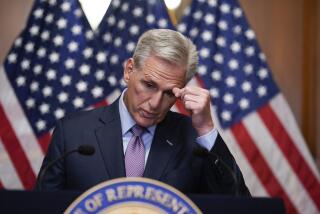The Folly of Divided Government
- Share via
WASHINGTON — Quick: Name the last U.S. national election in which voters, grudgingly, sullenly, handed two of the top three offices in the Land of the Free and the Home of the Brave to men they told exit-poll takers they disapproved of or distrusted--President Bill Clinton and House Speaker Newt Gingrich (R-Ga.).
How absurd, then, to hear political analysts describe Nov. 5 as a “status quo” election reflecting basic American contentment. Nothing could be farther from the truth. Not with a majority of Americans questioning their leaders’ integrity and calling the country “off track.” Not with the lowest ratio of citizens voting on Election Day since 1924--especially because such voter nonparticipation has been a revealing litmus test of weaknesses in the system.
The Washington of Clinton and Gingrich is less a mountain of national pride and history than a moral molehill. The electorate has turned to a division of government--a Democratic president facing a Republican Congress--that has no record of succeeding, because there’s no other choice but to have the two branches watch each other.
For the first time in U.S. history, the Democratic president and the GOP speaker both have special counsel or appointed investigators looking into questions about their ethics and integrity. Both will probably survive, but every downtown Washington restaurant at lunch time has a table or two of rumormongers discussing the implications if one or both do not.
It’s possible the country can get through this new pattern of divided government if America’s economic and international luck holds. Then it’ll be enough for the Republicans to huff and the Democrats to puff, together keeping the ship of state off the rocks--if not under full steam. But if there is a crisis, whether scandal-generated, money-linked or war-triggered, then the potential ineffectiveness of a Democratic president facing a GOP Congress could come front-and-center.
The notion that this is an effective framework for national governance has a basis in hope, but not in history. The Republican Congress versus Democratic president face-off we have just seen in Washington was a failure during its first 16 months--until the GOP realized its reckless assaults on the federal safety net (Medicare, education and the like) and attempts to shut down the government had been a public-relations disaster.
This summer, however, the GOP’s worried congressional wolves put on sheep’s clothing, orchestrated a success or two with welfare reform and immigration law changes and prayed their woolly outfits would work through Election Day. But they probably wouldn’t have worked--mid-October polls showed a 5-10 point Democratic edge in generic voting for Congress--until Clinton’s sleazy foreign fund-raising and influence-peddling schemes became a fat target for both Bob Dole and Ross Perot in the last two weeks of the race. With Clinton’s overall ethics already suspect, his election support declined by about five points--with Dole and Perot more or less splitting the changeover. Democratic congressional candidates probably lost about 2-3 points nationwide, which almost certainly saved the House for the GOP.
Which is how the United States wound up choosing two more years of an implausible division of government. At this point, some readers will be saying, “Wait a minute, haven’t we had divided government for most of the time since the 1950s?” Yes, but that involved a GOP president, usually a moderate conservative, dealing with a Democratic Congress--often dominated by a coalition of Southern Democrats and Republicans. Even GOP presidents such as Dwight D. Eisenhower and Richard M. Nixon worried that full-fledged GOP Congesses were too extreme and preferred bipartisan centrists. The first 16 months of the 104th Congress in 1995-96 proved this.
Since the Republican vs. Democratic fight began in the 1850s, there have been only three examples, prior to 1995-96, of a split between a Democratic president and a Republican legislature: the 54th Congress in 1895-96; the 66th Congress in 1919-20, and the 80th Congress in 1947-48. Each time, the next election got rid of this artificial, unproductive division, which usually stemmed from a mid-term rejection of the Democratic chief executive, and opted for a government where the same party controlled both the White House and Congress.
Corruption is probably the best explanation of what happened on Tuesday. Clinton has more sorts of alleged and apparent scandal under investigation--problematic real-estate finance (Whitewater), sexual harassment, misuse of the FBI, corrupt campaign finance--than any other president, including Warren G. Harding, Lyndon B. Johnson and Nixon. Dole spent much of late October arguing that Clinton is to integrity what Madonna is to chastity, and Perot was predicting that Clinton was headed for a “Second Watergate” of investigations and prosecutors if reelected; so it’s not surprising that the unseemly revelations about Indonesian contributions to Clinton’s reelection fund sent his polls sliding.
A week before Election Day, even Clinton’s super-Teflon was developing thin spots, and there was more than a whiff of Watergate in the air. In late October, 1972, as the Watergate revelations about the Nixon administration and Nixon himself were intensifying, voters displayed two reactions that were repeated on Tuesday: spreading disillusionment that produced declining voter turnout, and an unwillingness to give the scandal-tainted president a Congress of his own party--even though polls had made that appear likely.
Twenty-four years ago, the Watergate scandal that overtook Nixon produced an artificially liberal Congress for some years in the mid-1970s, and it’s possible that historians may record the opposite in 1996--the extended life of a partly discredited conservative ideology in Congress because of the drag of Clinton’s ethical problems. Weak 1996 turnout among core Democratic constituencies--young people, minorities and blue-collar workers--disillusioned by Clinton’s opportunistic pandering to moneyed interests, may have, paradoxically, intensified the drag on Democratic congressional candidates.
That 1996 produced the lowest voter turnout ratio since 1924 is also important. Voting is a kind of civic seismograph. The previous low turnout records--in 1924, 1948, 1988 (and also 1972)--came during periods of scandal (from Teapot Dome to Iran-Contra), special-interest politics and public disgust with the choices offered. The high stay-at-home vote in 1996 was posing its periodic question: Why was it worth going to the polls?
Indeed, the Republican and Democratic parties may only be at the beginning of a major electorate backlash against corrupt campaigns, sleaze and politicians’ fidelity to contributors rather than voters. The 8% of the vote that Perot received on Tuesday means his Reform Party will qualify for federal funding in the presidential election of 2000. With serious candidates likely to pursue its nomination, we may finally on the verge of a two-and-a-half-party system with a new, reformist ingredient.
Moreover, the voter anger revealed in the late October shift away from Clinton to Perot and Dole, and the public’s apparent willingness to block possible Clinton behavioral abuses with a GOP Congress, suggests a new sensitivity. Cynical voters seem ready to use the two distrusted parties to mount guard on each other. That is the only mandate either party can claim in this election.
And Clinton is not the only national politician being targeted. Voters have Gingrich’s ethical number, too. In affluent, reform-minded northwest Connecticut, House Ethics Committee Chairman Nancy A. Johnson--nicknamed “Stonewall” Johnson because of her 1995 efforts to save Gingrich from serious investigation--saw the GOP landslide returns of two years ago collapse into bare political survival on Tuesday. That sent an important message inside the Beltway: The speaker is vulnerable.
Had Gingrich been investigated by Congress in 1995-96 as seriously as Clinton was, the result could have guaranteed GOP loss of control, and Democrats have reason to demand every possible 1997-98 probe of the speaker--especially if Republicans pursue their own cause for launching new inquiries against the president. So gridlock is not the only impending threat--bipartisan institutional “sleazelock” is another possibility, even if the evidence never makes the final legal jump to Sleazegate.
It’s not a pretty picture. Maybe the country will be lucky enough to avoid a serious crisis that puts this divided and distrusted federal government to the test. But spending the next two years with our fingers crossed won’t be pleasant.*
More to Read
Get the L.A. Times Politics newsletter
Deeply reported insights into legislation, politics and policy from Sacramento, Washington and beyond. In your inbox twice per week.
You may occasionally receive promotional content from the Los Angeles Times.










